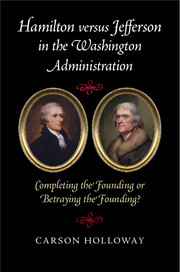 Hamilton versus Jefferson in the Washington Administration
Hamilton versus Jefferson in the Washington Administration Book contents
- Frontmatter
- Dedication
- Contents
- Acknowledgments
- 1 Introduction
- PART I A DEBATE BETWEEN CABINET COLLEAGUES
- PART II A CLASH OF RIVAL PARTY LEADERS
- PART III Founding Foreign Policy
- 11 Two Views of the French Revolution
- 12 Faith among Nations I: Jefferson's Opinion on the French Treaties
- 13 Faith among Nations II: Hamilton's Opinion on the French Treaties
- 14 The Constitutional and Political Theory of Hamilton's Pacificus Papers
- 15 Jefferson, Madison, and Helvidius' Critique of Pacificus
- 16 Conclusion
- Index
16 - Conclusion
from PART III - Founding Foreign Policy
Published online by Cambridge University Press: 05 November 2015
- Frontmatter
- Dedication
- Contents
- Acknowledgments
- 1 Introduction
- PART I A DEBATE BETWEEN CABINET COLLEAGUES
- PART II A CLASH OF RIVAL PARTY LEADERS
- PART III Founding Foreign Policy
- 11 Two Views of the French Revolution
- 12 Faith among Nations I: Jefferson's Opinion on the French Treaties
- 13 Faith among Nations II: Hamilton's Opinion on the French Treaties
- 14 The Constitutional and Political Theory of Hamilton's Pacificus Papers
- 15 Jefferson, Madison, and Helvidius' Critique of Pacificus
- 16 Conclusion
- Index
Summary
The intra-cabinet contest over the status of the French treaties and the public argument between Pacificus and Helvidius over the scope of the executive authority mark the end of Hamilton and Jefferson's major conflicts during their service together in the Washington administration. Jefferson resigned as secretary of state effective the last day of 1793. Hamilton remained in the cabinet for another year and one month, laying down the office of secretary of the treasury on January 31, 1795.
Although neither man could approve the other's contribution to the new republic, Washington could approve both. “I cannot suffer you to leave your station,” the president wrote to Jefferson, “without assuring you that the opinion which I had formed of your integrity and talents, and which dictated your original nomination, has been confirmed by the fullest experience; and that both have been eminently displayed in the discharge of your duties.” In his reply to Hamilton's resignation, Washington told his departing secretary of the treasury: “In every relation which you have borne to me, I have found that my confidence in your talents, exertions, and integrity has been well placed. I the more freely render this testimony of my approbation because I speak from opportunities of information which cannot deceive me and which furnish satisfactory proof of your title to public regard.” As we noted at the beginning of this study, by his own admission, Hamilton's public service was motivated by the love of fame or a desire to win “individual reputation.” Perhaps he could take some satisfaction in knowing that in Washington's judgment he had truly earned it.
Hamilton and Jefferson's political disagreements would continue through the 1790s and beyond. As he departed as secretary of state, Jefferson left behind a report that condemned British trade policy toward America as discriminatory and called for American commercial retaliation. Hamilton regarded such a policy as dangerous, and he assisted congressional Federalists in constructing an extensive critique of Jefferson's recommendations. In 1795, Jefferson condemned the Jay Treaty as strongly as Hamilton approved it, and in 1798, Jefferson denounced the Alien and Sedition Acts, which Hamilton defended. Moreover, Jefferson's opposition to those laws led him to author the Kentucky Resolutions, which manifested a spirit that Hamilton believed would, if not checked, “destroy the Constitution of the U[nited] States.”
- Type
- Chapter
- Information
- Hamilton versus Jefferson in the Washington AdministrationCompleting the Founding or Betraying the Founding?, pp. 324 - 334Publisher: Cambridge University PressPrint publication year: 2015


